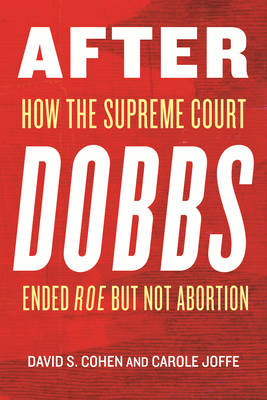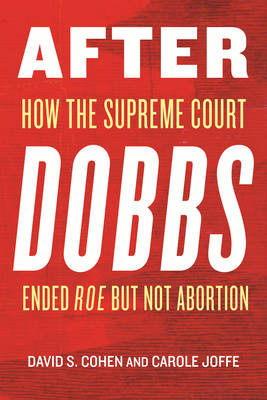
Door een staking bij bpost kan je online bestelling op dit moment iets langer onderweg zijn dan voorzien. Dringend iets nodig? Onze winkels ontvangen jou met open armen!
- Afhalen na 1 uur in een winkel met voorraad
- Gratis thuislevering in België vanaf € 30
- Ruim aanbod met 7 miljoen producten
Door een staking bij bpost kan je online bestelling op dit moment iets langer onderweg zijn dan voorzien. Dringend iets nodig? Onze winkels ontvangen jou met open armen!
- Afhalen na 1 uur in een winkel met voorraad
- Gratis thuislevering in België vanaf € 30
- Ruim aanbod met 7 miljoen producten
Zoeken
After Dobbs
How the Supreme Court Ended Roe But Not Abortion
David S Cohen, Carole Joffe
Hardcover | Engels
€ 37,95
+ 75 punten
Omschrijving
How hard-working individuals have kept abortion afloat in the wake of Roe v. Wade's destruction, and the continued help needed if we want to sustain it When the Supreme Court overturned Roe v. Wade in June 2022, many feared it meant the end of abortion access in the United States. Yet the courageous work of people on the ground has allowed abortion to survive post-Dobbs in ways that no one predicted. In After Dobbs, law professor David S. Cohen and sociologist Carole Joffe interview 24 people across all different fields in abortion and in different state political environments to uncover how the abortion providing community and its allies prepared for, and then responded to this momentous event. Taking place across three intervals throughout 2022--pre-Dobbs in early 2022, right after Dobbs, and then six months later--these interviews showcase how nimble thinking on the part of providers, growth and new delivery models of abortion pills, and the never-ending work of those who help with abortion travel and funding have ensured most people who want them are still getting abortions, even without Roe. But, as much as this is cause for celebration, the work required to make abortion possible is difficult and costly--in time, money, and emotion. There may soon come a time when the overturning of Roe means a much more severe decline in the number of people able to obtain the abortions they seek. But because of the work of the people in this book and those like them, even though Roe is dead, abortion is not . . . yet.
Specificaties
Betrokkenen
- Auteur(s):
- Uitgeverij:
Inhoud
- Aantal bladzijden:
- 248
- Taal:
- Engels
Eigenschappen
- Productcode (EAN):
- 9780807017661
- Verschijningsdatum:
- 25/03/2025
- Uitvoering:
- Hardcover
- Formaat:
- Genaaid
- Afmetingen:
- 160 mm x 235 mm
- Gewicht:
- 566 g

Alleen bij Standaard Boekhandel
+ 75 punten op je klantenkaart van Standaard Boekhandel
Beoordelingen
We publiceren alleen reviews die voldoen aan de voorwaarden voor reviews. Bekijk onze voorwaarden voor reviews.











